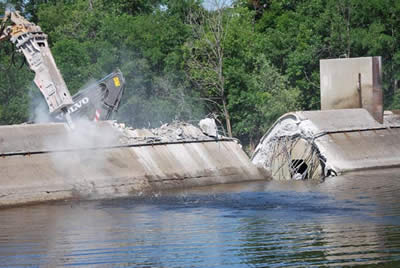Remarks by NRCM Executive Director Brownie Carson Good morning and welcome to the 10th anniversary celebration of the removal of the Edwards Dam. Ten years ago, many of us who are here today stood on the opposite bank of the Kennebec to witness the beginning of a new chapter for this great river. On that Read More
Edwards Dam and Kennebec Restoration
For more than a decade, NRCM and the Kennebec Coalition worked to open up the Kennebec River to sea-run fish past the Edwards Dam in Augusta. In a precedent-setting action, the Federal Energy Regulatory Commission (FERC) decided that the ecological value of a free-flowing river was greater than the economic value of a dam. The Edwards Dam was removed on July 1, 1999.
Today, millions of alewives swim from the Atlantic Ocean up the Kennebec every spring in what is perhaps the largest alewife run on the eastern seaboard.
Kennebec River Reborn 10 Years After Dam Removal
People and wildlife have benefited from river’s recovery NRCM news release Augusta, ME – State, federal and local officials and conservation leaders gathered on the bank of the Kennebec River today to celebrate one of our nation’s most significant and successful river restoration projects. Ten years ago, the 160-year-old Edwards Dam was removed to restore Read More
Ten Years After Dam Removal Kennebec River Fish are Jumping Back
by Susan Sharon Maine Public Radio news story For centuries, dams that harnessed water power fueled factories around the Northeast. But the walled barriers prevented migrating fish from reaching their native spawning grounds. Water quality and entire ecosystems changed. Think about a dam on a river you know. Imagine what would happen if that structure Read More
Endangered Species Protections Extended to Atlantic Salmon on Three Major Maine Rivers
by Anne Ravana Maine Public Radio news story The U.S. Fish and Wildlife Service and National Oceanic and Atmospheric Administration’s Fisheries Service today extended endangered species protections to Atlantic salmon in the Penobscot, Kennebec, and Androscoggin rivers and their watersheds. The news has not been well received by some Maine officials. The state’s Department of Read More
NRCM Gives Award to Law Firms in Portland, D.C. for River Restoration Efforts
Augusta, ME – Two law firms, Verrill Dana in Portland, Maine, and Wiley Rein in Washington, D.C., have been awarded a 2008 Natural Resources Council of Maine Environmental Award for their tireless efforts to free the Sebasticook River by removing the Fort Halifax Dam in Winslow. For about 100 years, the Fort Halifax Dam at Read More
Fort Halifax Dam Breached
by Colin Hickey, staff writer Kennebec Journal news story WINSLOW — Closure came to the controversy surrounding Fort Halifax Dam on Thursday morning with a few blows from a hoe-ram. The demolition machine, essentially an excavator with a hydraulic hammer, began to breach a portion of the 100-year-old hydroelectric facility at about 10 a.m., as Read More
Fort Halifax Dam Removed to Open Fish Passage in Sebasticook
On July 17, 2008, after more than 5 years of legal battles, FPL Energy Maine Hydro breached the Fort Halifax Dam in Winslow. Finally, this section of the river will flow freely again and native sea-run fish – striped bass, salmon, sturgeon, and shad – will be able to return to waters they have not seen Read More
Revitalized River Flows to Healthy Future
by Larry Grard, staff writer Kennebec Journal news story There was a time within many people’s lifetimes when almost no one would have fished the confluence of the Kennebec and Sebasticook rivers in Winslow. Tanneries, factories and mills dumped municipal sewage into the Kennebec and its tributaries, fouling the waters as they flowed through Augusta Read More
Battle of Fort Halifax Drawing to a Close?
Kennebec Journal editorial The end may finally be in sight for the long-running conflicts over the Fort Halifax Dam on the Sebasticook in Winslow. The dam is an integral part of the state and federal government’s plan to restore native, migratory fish such as alewives, shad, sturgeon and atlantic salmon to the upper reaches of Read More











